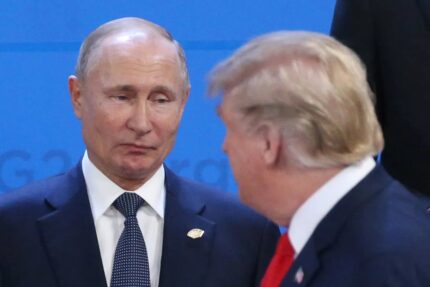President Donald Trump has issued a stern warning to Russian President Vladimir Putin, demanding an end to the ongoing war in Ukraine or face severe economic consequences. In a post on his social media platform, Truth Social, Trump vowed to impose high tariffs and further sanctions on Russia if the conflict persists. His remarks signal a shift in tone as he positions himself as a potential peace broker ahead of the 2024 U.S. presidential election.
Trump’s Ultimatum: Settle Now or Face Economic Consequences
Writing on Truth Social, Trump framed his demand as a favor to both Russia and Putin, arguing that settling the war now would be in Moscow’s best interest. He warned that failure to do so would force him to impose heavy economic penalties.
“Settle now, and STOP this ridiculous War! IT’S ONLY GOING TO GET WORSE,” Trump wrote. “If we don’t make a ‘deal’, and soon, I have no other choice but to put high levels of Taxes, Tariffs, and Sanctions on anything being sold by Russia to the United States, and various other participating countries.”
His threat of additional sanctions comes as Russia’s economy struggles under existing U.S. and European restrictions. Since the 2022 full-scale invasion of Ukraine, Russian imports to the U.S. have plummeted, with the remaining key exports being phosphate-based fertilizers and platinum. Trump, however, has not provided specifics on which sectors would face further penalties or when these measures might take effect.
Putin’s Response and the Kremlin’s Stance on Negotiations
The Kremlin has yet to officially respond to Trump’s remarks, but Russian officials have recently hinted at a limited window for negotiations with a potential new U.S. administration. Putin has previously expressed willingness to discuss an end to the war but insists that Ukraine must acknowledge Russia’s territorial gains, which currently include around 20% of Ukrainian land. He also maintains that Ukraine must abandon its NATO aspirations—a key point of contention between Moscow and Kyiv.
Russia’s deputy UN ambassador, Dmitry Polyanskiy, told Reuters that Moscow would need clarity on Trump’s proposed terms before considering any moves toward peace talks. Meanwhile, prominent Russian state media figures, such as Margarita Simonyan, have begun discussing “realistic” conditions for ending the war, suggesting that Russia may be preparing its citizens to accept a compromise that falls short of the previously envisioned total military victory.
Ukraine’s Reaction: Cautious Optimism but Demand for U.S. Action
Ukrainian leaders have consistently argued that Putin only responds to strength, and Trump’s tougher rhetoric might align with Kyiv’s long-standing calls for increased pressure on Moscow. However, initial reactions from Ukraine indicate skepticism about whether Trump’s words will translate into concrete actions.
President Volodymyr Zelensky has maintained that Ukraine will not accept any settlement that legitimizes Russia’s territorial gains. Speaking at the World Economic Forum, Zelensky emphasized the need for at least 200,000 peacekeepers, including U.S. troops, to ensure a lasting deterrent against future Russian aggression. In an interview with Bloomberg, he stressed that a peacekeeping force “can’t be without the United States… Even if some European friends think it can be, no it will not be.”
On social media, Ukrainian commentators were largely dismissive of Trump’s sanctions threat, arguing that economic penalties alone are insufficient to halt Russian aggression. Instead, many in Kyiv are focused on whether Trump, if re-elected, would sustain or even increase military aid to Ukraine—a crucial factor in the ongoing conflict.
The Bigger Picture: Trump’s Influence on the Ukraine War Debate
Trump’s statements on Ukraine carry significant weight, especially as the 2024 U.S. presidential race heats up. Throughout his political career, he has expressed mixed views on Russia, at times criticizing NATO while also acknowledging Moscow’s security concerns. His latest remarks suggest a tougher stance on Putin, though his exact strategy remains unclear.
His Truth Social post also included a message of “love” for the Russian people, along with a reference to Soviet losses in World War II—an issue of great significance in Russia. However, Trump exaggerated the USSR’s wartime casualties and appeared to conflate the Soviet Union with Russia alone, ignoring the millions of Ukrainians and other Soviet citizens who also perished.
As the war in Ukraine enters its third year, both Kyiv and Moscow remain locked in a battle with no clear resolution in sight. While Trump’s intervention could reshape diplomatic efforts, his history of controversial foreign policy statements leaves many uncertain about his ultimate approach. For now, Ukrainians are not placing much hope in his words, instead awaiting tangible actions that could shift the balance on the battlefield and at the negotiation table.














